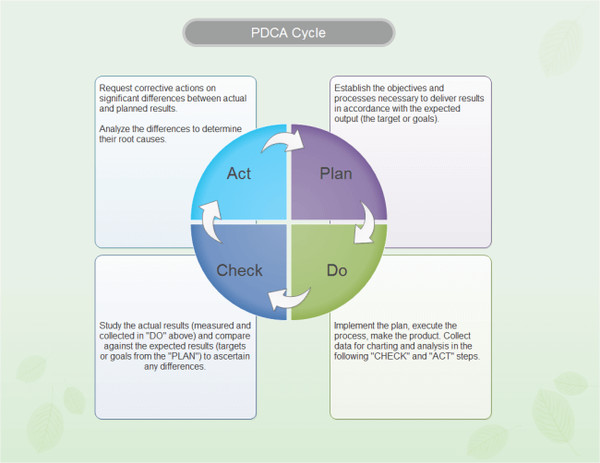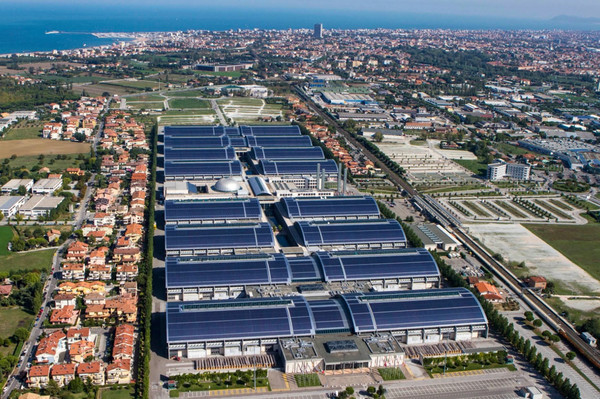ISO 20121 CERTIFICATION: A NEW MILESTONE FOR IEG
Italian Exhibition Group has gained certification for the Rimini and Vicenza fairgrounds, and the organisation of Ecomondo, and at the beginning of 2023, Rimini’s Palacongressi will also be certified. The prestigious award was achieved thanks to the support of multi-utility Hera.
The ISO 20121 standard is based on the previous British event management standard, BS8901, and was produced to help organisations improve the sustainability of their events. The standard provides the framework to measure, minimise and eliminate the negative environmental, social and economic impacts of an event, to optimise planning and processes and to maximise the benefits of events.
Italian Exhibition group's environmental sustainability journey starts way back, from the day the new exhibition centre was inaugurated in 2001.
Starting with the prestigious international recognition Elca, Green Building in Nuremberg, IEG then obtained ISO 14001 Environment, ISO 450001 health and safety at work and GBAC Star Global Biorisk Advisory Council certification.

The ISO 20121 standard, not just the environment
In the last decade, significant progress has been made in the way companies have integrated sustainability into their approach to business, and most large corporations now believe that a focus on environmental factors and social concerns is beneficial. Extending the concept of corporate sustainability to events is a challenge, given the temporary nature and the multiple factors that are involved in events.
For this reason, the events industry, inspired by the 2012 London Olympics, has developed a new international standard to support and guide organisations seeking to ensure planning in line with sustainability standards.
This event management standard is the ISO 20121 standard, named after the year of the London Olympics. ISO 20121 is based on the previous British event management standard, BS8901, and was produced to help organisations improve the sustainability of their events.
For organisations without a sustainability strategy, the standard can also represent a catalyst, with the sustainable event acting as a pilot for the launch of a wider sustainability programme. While previous standards have focused solely on environmental issues, ISO 20121 aims to drive sustainability performance holistically and strategically by including all three pillars of sustainability: economic, social and environmental.
The method – plan, do, check, act
The standard provides the framework necessary to measure, minimise and eliminate the negative environmental, social and economic impacts of an event, to optimise planning and processes and to maximise the benefits of events.
It aims to ensure that all events leave a positive and lasting legacy.
Adopting a systematic method to address event sustainability creates an integrated, comprehensive and coherent approach.
Establishing a management and guidance system provides a proven path to successfully identifying and managing sustainable development issues and, most importantly, sharing corporate policy with a wider group of stakeholders on an ongoing basis.
The benefits of implementing a sustainable event management system are to identify issues, impacts, risks and opportunities.
It will make achieving sustainable development goals more likely and provide more opportunities for the event to be certified to an international standard.
This standard is not designed as a checklist but is presented as a sequential process, following the Deming cycle of PLAN, DO, CHECK, ACT, with a series of activities within each phase of the cycle.

IEG’s commitment
In a nutshell, ISO 20121 certification commits IEG directly, through its employees and suppliers, to:
- encouraging complete satisfaction in the activity carried out, a prerequisite for the creation of value and sustainable development;
- ensuring universal accessibility in relation to the rights of people with disabilities;
- using equipment, operating methods and organisational arrangements that protect the environment by reducing emissions;
- optimising mobility systems and reducing the production of waste;
- increasing separate waste collection and reducing energy and water consumption;
- using qualified suppliers for quality, safety and environmental aspects;
- informing and raising the awareness of all employees, suppliers, local partners, customers and event participants on environmental and sustainability issues.
This commitment is set out in IEG Group's Policy for the Environment, Health, Safety and Sustainable Management.
The best practices introduced with the design of the Ecomondo event include the absence of carpeting from the aisles inside the pavilions, with an environmental saving of more than 140 tons of carpet per year; collecting and recovering cigarette butts; expanding electric car recharging stations; making the area accessible to the disabled; increasing the installed power of photovoltaic systems; and involving local stakeholders.
The district is equipped with 1,500 plants irrigated by surface water, the halls are lit by 850 LED spotlights that save emissions of 120 tonnes of Co2 per year and consumption of 360,000 Kwh.
The photovoltaic systems provide 8.5 million Kwh of clean energy, equal to the amount needed to make all our Italian sites self-sufficient. Water recovery saves 23 million litres, and all fountains recirculate water.

The underground ice bank provides room cooling while halving consumption. The indoor railway station is used by 20% of visitors and reduces traffic flows; there are seven electric charging stations for cars and motorbikes, and this number will soon be doubled.
“With this important certification, which with Ecomondo we were the first in Europe to obtain in the field of environmental trade shows, we give concrete form to the objectives for sustainable development of Agenda 2030, principles that are in line with IEG's values and at the basis of the company's policy," says Corrado Peraboni, Managing Director of IEG. "Recognition and best practices have generated virtuous behaviour in recent years, also among the hundreds of thousands of international visitors, but ISO 20121 represents a further step forward, a tangible contribution to the process of cultural change, which should be reflected in the behaviour required to protect the planet".
"Supporting a major industry player such as IEG in the complex process of certifying its exhibition centres, and an important event such as Ecomondo, is the natural consequence of sharing the objectives of sustainability and circular economy, which have always been at the heart of our corporate strategy," Orazio Iacono, CEO of the Hera Group, explains. "Thanks to ISO 20121 certification, designing sustainable events in line with economic and social considerations becomes even more strategic and tangible, while at the same time providing a balanced and long-term approach to environmental responsibility and social progress".

